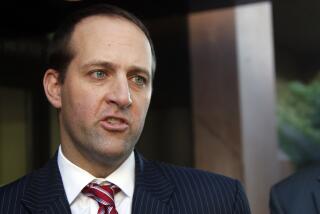2 at Teledyne Convicted in Pentagon Case
ALEXANDRIA, Va. — A federal jury Thursday convicted two Teledyne Electronics Inc. executives of criminal conspiracy and wire fraud in the first trial arising from the Ill Wind investigation of corruption in military procurement.
But the jury, which deliberated more than 35 hours over four days, acquitted the Teledyne executives, George H. Kaub, 50, and Eugene R. Sullivan, 58, of the most serious charge they faced, bribery of a public official.
A third defendant in the case, Teledyne Vice President Dale Schnittjer, 45, was found not guilty of all charges.
The case centered on the executives’ roles in a conspiracy to pay off Navy Department purchasing official Stuart E. Berlin for his aid in steering a $24-million electronics contract to Teledyne Electronics, a Newbury Park subsidiary of Los Angeles-based Teledyne Inc.
Victory for Prosecutors
The convictions are a substantial victory for prosecutors, who said they hope that the guilty verdicts will induce other targets of the sweeping investigation of Pentagon fraud to come forward and cooperate with the government.
“These convictions send a message to corporate officials that they cannot put these things in motion and then wash their hands of their guilt,” said the chief prosecutor, Assistant U.S. Atty. Joseph J. Aronica. “This is a very, very significant verdict.”
Lawyers for Kaub and Sullivan said that they will appeal.
“We are disappointed with the verdict, but we are glad he was acquitted on the most serious charge,” said George O’Connell, Sullivan’s attorney. Added Mark Touhey, Kaub’s lawyer: “Most important, he was found not guilty of bribery. That’s an accurate reflection of the evidence.”
Kaub was convicted of one count of conspiracy to defraud the government, five counts of wire fraud and two counts of filing false statements on contract documents. He faces a maximum of 40 years in prison and $2 million in fines.
Sullivan was found guilty of a single conspiracy charge and three counts of wire fraud. He faces a maximum of 20 years in prison and $1 million in fines.
“We’re disappointed and disheartened by the verdict, but we’re gratified that one employee was not convicted,” said Teledyne spokesman Berkley Baker. “We’re happy that the three employees were not convicted of bribery.”
Baker said the three employees remain on paid administrative leave but that their status will be reviewed in light of Thursday’s verdicts.
Aronica said that Thursday’s convictions would give momentum to the federal task force conducting the investigation. Dozens of other firms and individuals have been implicated in related cases, and Aronica said that new criminal indictments and guilty pleas will be forthcoming soon.
He indicated that other Teledyne executives might be charged.
Confessions and Convictions
In all, 14 individuals and two corporations now have confessed to or been convicted of crimes uncovered in the 3-year-old Pentagon corruption investigation.
According to the prosecution’s case, the Teledyne scheme began in November, 1985, when defense consultant William L. Parkin of Alexandria, Va., presented Teledyne with a proposal to help the firm obtain a contract to build radar test equipment for the Navy.
Parkin, a former high-ranking Navy procurement officer, told Sullivan and Kaub that he and a “consortium” of others could use their Navy contacts to assure Teledyne of the profitable contract.
On Sullivan’s and Kaub’s recommendation, Teledyne agreed to pay Parkin $10,000 in up-front money and promised him $150,000 later if Teledyne received the contract.
The Navy awarded Teledyne a $24-million contract for the equipment in July, 1987, and Parkin began pressing Sullivan and Kaub for his money. They told their superiors that Parkin was owed the money and began making monthly payments of $6,250 in March, 1988.
Parkin split his fee with defense consultant Fred H. Lackner of Woodland Hills, Calif., and Teledyne marketing representative Michael Savaides.
Each of the three contributed $342 a month in cash to pay Berlin, who was given envelopes stuffed with cash in a Virginia hotel bar and a restaurant bathroom. Over the next three months, Berlin received a total of $3,000, which he stored in a basement safe in his home.
The payments ended in June, 1988, when federal agents around the country served dozens of search warrants arising from the Ill Wind investigation.
Sullivan and Kaub contended during the weeklong trial that they were unaware that part of the $160,000 in payments they had authorized for Parkin would be used to bribe a government official. They testified also that the payments had been approved by their superiors at Teledyne.
Earlier this year, Teledyne pleaded guilty to conspiracy and fraud charges in the case, filed Jan. 6. Teledyne agreed to pay as much as $8.4 million in fines and reimbursements for the company’s participation in the scheme. Teledyne Electronics has been suspended indefinitely from all government work.
Berlin last month pleaded guilty to bribery and conspiracy charges and has been fired by the Navy. Savaides, Parkin and Lackner also pleaded guilty to bribery charges.
All are awaiting sentencing and testified for the prosecution in the trial of the Teledyne executives.
Kaub, Sullivan and Schnittjer have been suspended with pay since they were indicted in January. Teledyne paid their legal costs because the company believed that the men were innocent of the federal charges, a spokesman said. Teledyne blamed its involvement in the conspiracy on Savaides, who was fired last year.
The trial was held in U.S. District Court in Alexandria, Va., under Judge Richard L. Williams. Sentencing has been set for June 7.





